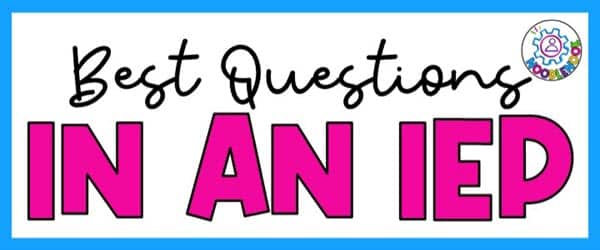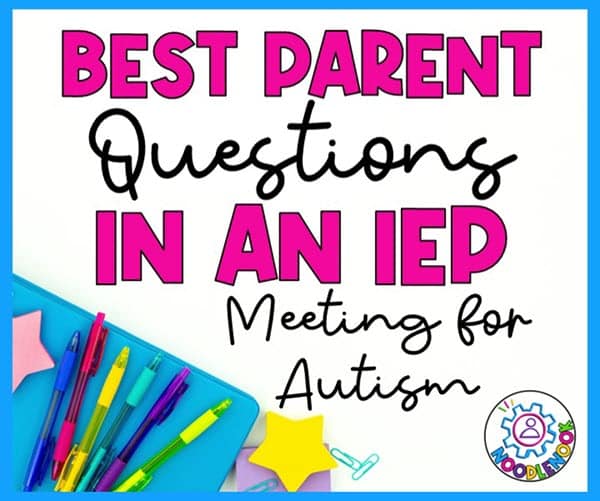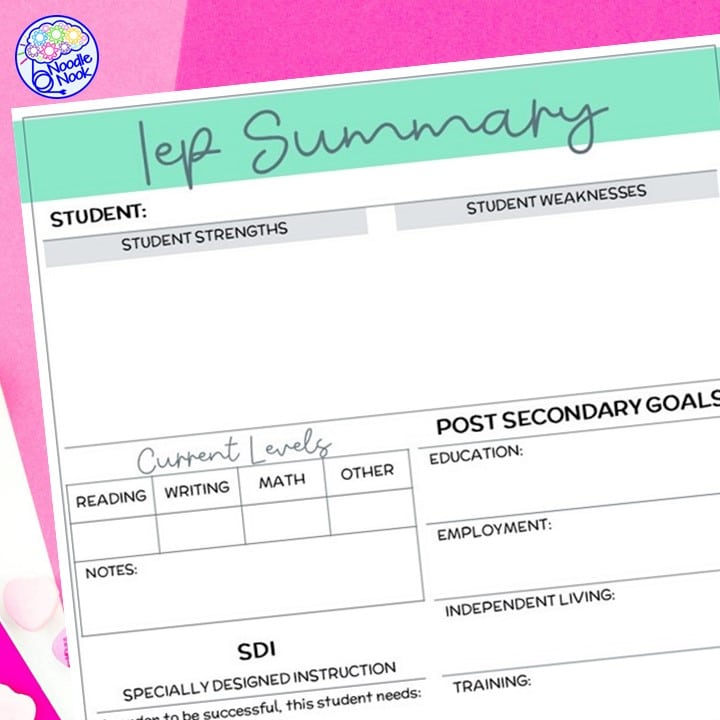Attending your child’s IEP meeting can be stressful. Heading out to the school district main office or campus administration suites kind of brings about a sense of anxiety. It’s made worse by the fact that these meetings to establish or continue special education services come around just once a year. That means making this educational plan feels very high stakes. The best way to ease that stress is to prepare a few questions, know what to listen for, and set out with some helpful tips listed below. When you do this, your annual meeting will be much easier! Let’s dive into some tips and insights, as well as questions to ask at an IEP meeting for autism diagnoses.
What Should I Know About IEPs
To start with the basics, an IEP (Individualized Education Program) is a child’s personal guidebook to their education. This legal document ensures that a child receives the specialized education they need to be successful in school in light of their diagnosed disability. This journey of establishing an educational plan starts with an evaluation process. Members of the school personnel will work together to determine if your child meets the requirements for services as part of the Disabilities Education Act under federal law. If the criteria are met, the process moves forward to establish an individual education plan. This plan will highlight the child’s needs, academic goals, and information relating to a behavior plan. Once the special education process starts, it doesn’t take long until you’re sitting in your first IEP meeting.
The IEP Team and Their Roles
As part of the IEP process, you will have a meeting. These happen every school year or more. In that meeting, there will be a collection of school professional staff. It will likely include a special education teacher, general education teacher, and school diagnostician or meeting liaison. It could also include a speech therapist, a school psychologist, and related service providers, like an occupational therapist or a physical therapist. Each person in this meeting is a member of the IEP team and plays an important role, and that includes you!
As the parent of a child with a disability, you have the most information about how a specific diagnosis manifests and impacts the ability of your child to learn and participate in grade-level tasks. You have a voice in that meeting, just like everyone else. That’s why the list of questions to ask at an IEP meeting for autism helps you guide the entire team to meet the unique needs of your child.
Basic Questions to Ask at an IEP Meeting for Autism
If this is your initial IEP meeting, there are some basic questions that you should understand the answer to before leaving your meeting. For the most part, the school staff will answer the following questions in due course as they proceed through the meeting agenda. It is possible however that at the end of your meeting, you feel like you’re missing some general information. Very least it’s a good idea to listen for the answers to the following questions:
- What are my child’s strengths and weaknesses? Knowing what your child is good at and what specific areas they struggle in is key to setting the right goals. Listen for academic and functional strengths & weakensses, but also listen for diagnostic points, like short-term memory deficits or information processing delays. These can help you give better supports at home and also support your child’s classroom teacher when the move to the next grade level.
- What specific goals are we setting? Goals are not the only thing your child will study at school. The IEP goals make up the specific areas that the intervention coordinator or classroom teacher will target. They should be made up of the most critical educational needs your child has. These are the most important things that limit your child’s ability to make independent progress in general education classes. So, make sure goals they’re crystal clear.
- What supports are you providing? Your child will likely have a set of specially designed instruction (SDI) guidelines. These are specific examples that outline how a classroom teacher will adjust thing to help your child to be successful. These may not come out all at once within the meeting, but be listed in the goals section, the present levels section, and the deliberations. That means listen closely and ask questions. You want to know what your child’s teachers are doing to help!
- What’s the plan for behavioral goals? Ask how the school is helping your child navigate the social world. This may be with negative behaviors and a specific behavior plan. Likewise, this could be to improve positive behaviors, like communication or social skills. These skills are critical for children who have autism spectrum disorder. The best thing is to make sure that there are specific behavior goals to address more than just academics in your child’s education.
- Are they in the least restrictive environment? Students can be educated in any number of places. Those will depend on your child’s specific needs. Pay attention to where your child will be learning. Will they be learning specific tasks and skills in a pull-out model? In this way, most of the child’s day is spent in the general education classroom. On the other end of things, they may be educated in a self-contained classroom. With this model, your child will spend the least amount of time with a regular education teacher and with nondisabled peers. make note of how many minutes your child will spend outside of an inclusion model. In some cases, this is the best way for your child to be educated given the extent of their disability. But it’s always a great question to ask, is my child being educated in the least restrictive environment?
These are pretty basic questions to ask at an IEP meeting for autism. They should be answered as part of the IEP meeting but, more importantly, you should feel that you have a good understanding of the answers provided. Remember you are your child’s primary advocate. Don’t understand how a student’s needs will be met as well as how decisions in this meeting impact your child’s learning, it could be that they spend an entire year not meeting the academic standards their nondisabled peers are working towards. It’s also possible that not knowing these answers can impact the behavioral support and academic accommodations that are provided for your child.
Key Questions to Ask Beyond the Basics
Remember, IEP stands for individual education plan or program. What it also stands for is “this is a legally binding contract”. Before the meeting closes and the IEP team members hit the door, here are a few questions to ask at an IEP meeting for autism:
- How are we getting ready for life after graduation? Let’s face it, an IEP plan is not just about a child’s progress in the current school year. It’s about finding ways to overcome a child’s disability and preparing them for life in the postsecondary. Your child has goals, and so do you! You may be preparing for post-secondary education, like college, full- or part-time employment, access and participation in training programs, or independent living. You should see there are goals within the IEP that support your child to meet their full potential and find success in each of these areas.
- How can I best support my child’s learning at home? Learning doesn’t stop at school. If you’re a proactive parent, then it helps to understand what you can do at home to reinforce your child’s educational needs before the next IEP meeting. The school may allocate an autism resource specialist to provide additional resources or strategies for you to use at home. Sometimes, however, those offers are not made if a parent does not ask.
- How will assistive technology and daily technology tools be used to support my child’s success? I have a lot of strongly held beliefs about providing children with disabilities appropriate support to help them make the most progress in a given school year. Whereas assistive technology tools were sparse and hard to come by a few decades ago, now technology is everywhere! The problem is that a child may not be able to use reasonable technology tools to help them find success if it’s not written in a student’s IEP. Take a second to ask specifically about how technology is a part of the plan.
- Can I be provided with more frequent progress monitoring for my child? Every student gets a progress report as part of the natural assessment and reporting cycle of a school. For a child with special needs, I have found that parents sometimes want more frequent reporting as a regular part of my weekly schedule. If you need additional reporting, maybe in order to share information with outside service providers or medical providers, then make sure that you ask for it and it’s documented in the IEP. It can be hard to hold teachers to account for things that aren’t in your legal agreement. If you do not need this additional information, however, then don’t ask for it on principle. It places an added burden on the teacher and removes them from instructional minutes that they can spend with your child or with other students.
- When will this new set of services start? After a meeting ends, the teachers and support staff have a few days to get ready to implement the plan. You also have some time to get a copy of the plan in hand. Allows you the opportunity to review it and reach out if anything seems off. At most public schools, you can waive the waiting. That means a new set of services can be started right away. This could benefit a student, or it could work against them. So just be clear how long the waiting period is before the new set of services agreed upon in the meeting will begin. If your child is continuing on with the same set of services and classroom assignments as last year, it likely won’t matter. If there is a substantial change of placement, however, then knowing the timing is important.
All in all, knowing the right questions to ask at an IEP meeting for autism is really about guiding the team towards your child’s success. That and making sure that your legal document reflects the intent of the meeting. That means within the final document, you want to be sure everything stated in the meeting has been put down in writing. When you get the final IEP document, read it, understand it, and keep it handy. If it feels like something is missing, don’t hesitate to ask for help from the school.
RECAP: Questions to Ask at an IEP Meeting for Autism Diagnosis
Despite being in an IEP meeting with a team of professionals, sometimes it is up to you to make sure you have a successful IEP meeting. That means having the right questions ready and not settling for less than what your child is entitled to. Don’t feel bad about these questions to ask at an IEP meeting for autism. They are well-founded.
As a special education teacher, I can tell you that IEP meetings are never meant to be contentious. Instead, remember that you are part of a team whose goal is to make sure a child has the ability to learn and the opportunity to be successful. Knowing these questions to ask at an IEP meeting for autism diagnosis just ensures that everyone is working towards the same goal and that you understand exactly what that looks like.
READ MORE:
Want to read more? Check out these helpful posts with ideas for your IEP meeting:
This post with questions to ask at an IEP meeting for Autism will be handy this year and at future meetings. Bookmark it, print it, or pin it on Pinterest to ensure easy access when you need it again.



